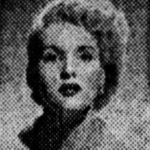
About
Born:
Died:
Helene Dixon was born Helene Dimone; she was asked to change her name when she began making records to avoid confusion or association with Vic Damone. A nineteen-year-old singer called Helene Dimone was arrested in New York in 1951 for marijuana posession, and she reported having been a touring performer since the age of sixteen.
Dixon started her career in music largely by entering competitions, including scoring an appearance on Arthur Godfrey’s Talent Scouts. She went on tour with comedian and country performer Red Ingle, and then she landed work at the Copacabana in New York City. While at the Copa, Dixon met and worked with bandleader and arranger Phil Moore—known as the “starmaker” for his help in providing musical training for stars including Betty Grable, Lena Horne, and Marilyn Monroe. Dixon toured widely; advertisements for her shows can be found all over the United States and Canada throughout the 1950s. She also worked with the Ray Conniff orchestra and became a regular fixture on the Steve Allen Show.
She cut a number of sides for Okeh and then for Epic records, before eventually landing at Vik. “Don’t Call My Name” (1953), backed by Phil Moore’s orchestra, was noted in newspapers for success as a jukebox hit, but it never charted. Vik Records made the clearest attempt to market Dixon as a rock and roll singer: she did a blistering cover of Chuck Berry’s “Roll Over Beethoven” for the label in 1956. Billboard noted in its review: “the comely chirp, who has moved to the label from Epic, belts out the Chuck Berry material in potent, growling rock and roll style to strong backing. This would seem a certain money-maker for the label.”
Dixon was reportedly in a car accident in 1953, and after that, began suffering blackouts. Her career slowed in the late 1950s, and she had a son in 1960. In 1961, Dixon was injured under mysterious circumstances after falling unconscious, and she was hospitalized in a coma with a fractured pelvis and a broken shoulder. She survived and is listed as talent for several events in 1967, but it is unclear what happened to her after that.
“Don’t Call My Name” / “The Breeze (That’s Bringin’ My Honey Back To Me).” Okeh 4-6964 (1953).
“Life’s Not The Same Without You” / “Don’t Ever Change.” Epic 5-9002 (1953).
“Temptation” / “My Reward Is Lovin’.” Epic 5-9021 (1954).
“Somebody Else” / “I’ll Be Satisfied.” Epic 5-9044 (1954).
“A Teenager Sings the Blues” / “Roll Over Beethoven.” Vik 0212 (1956).
“The Opposite Sex” / “Now, Baby, Now.” Vik 0228 (1956).
“Marijuana Traced to Girl Singer,” Democrat Chronicle (Rochester, NY), 21 October 1951.
“She Made Name for Self Using Someone Else’s: First Record a Jukebox Hit,” Pittsburgh Press, 24 June 1953.
“Reviews of New Pop Records,” Billboard, 26 May 1956, 48.
“Vocalist Listed for Dance Event,” Bridgeport Post (Connecticut), 12 June 1957.
Mike Manson, “Hard-Luck Thrush Out of Coma, Blames Fall,” Daily News (New York), 23 April 1961.
